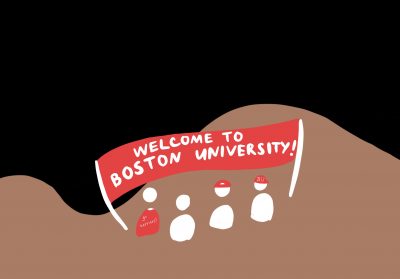Allegations of systemic abuse perpetrated by Orientation Director Shiney James came out Monday, leading to an avalanche of comments and responses on Twitter of other students sharing their experiences of abuse as orientation staff.
James is said to have created a toxic working environment in which she was reported to have verbally berated certain student workers to the point of tears and repeatedly subjected them to invasive questions about their personal lives. Many people who worked under James described the long-term psychological damage they carry from their time working as Orientation leaders.

The Boston University administration should fire James. She is personally responsible for hurting the health and mental well-being of many students, as well as potentially their careers.
But she is just the tip of the iceberg.
It should be acknowledged that James represents a larger harmful system at play in the University’s relationship to its student employees.
First, student workers are especially vulnerable within the university system. For many, their employment at BU may be their first job. Students may be unaware of their rights as workers or may feel uncomfortable speaking out against poor conditions. This leaves them practically defenseless to exploitation and abuse.
Moreover, the current student employment structure forces students to depend on their employers for more than just a paycheck. For instance, for some campus jobs, students working during the summer rely on their employment for free housing. Students working during the Fall rely on their University employment to receive their full work-study grant. This means that a student not only risks losing their source of income, but also their housing and their access to education if they report an abuse of authority.
In addition, BU heavily discourages student workers from unionizing, even though students are legally allowed to, framing student workers’ right to strike as disruptive to students’ “academic progress.”
But wouldn’t exploitative working conditions be just as disruptive to the academic process?
There are simply not enough protections in place for student workers. From students alleging underpaid training periods to the Orientation office allegedly editing students’ work hours to pay them less, the university student worker system is rife with exploitation and abuse of power.
This is not to say that BU as an employer is unique in its exploitation of its workers. Much has been written about the realities of capitalism and the state of employment in America. It’s just that, as a nonprofit and as a university, it is especially disheartening to see this kind of abuse in a place that calls itself a site of learning and innovation.
Second, the sheer amount of students alleging abuse from James — as well as multiple allegations from students that state they formally complained to the University about this abuse — indicate James’ systemic abuse of her employees was an open secret.
We understand that firing someone must be a bureaucratic nightmare. But it’s well past the point to ask why exactly it is so hard to fire someone who harms students. Why is it so difficult to fire abusers?
At the end of the day, we, as students, are all paying for Shiney James to work here. That in itself should be reason enough for her dismissal given all that she has allegedly done to students. And BU’s action on this front, if they choose to protect Orientation student workers, cannot end here.
It is fair to say — from the deluge of responses to the allegations against James — there are very likely many like James across campus. This is not an issue that can be boiled down to one person, and BU should not treat it in this way.